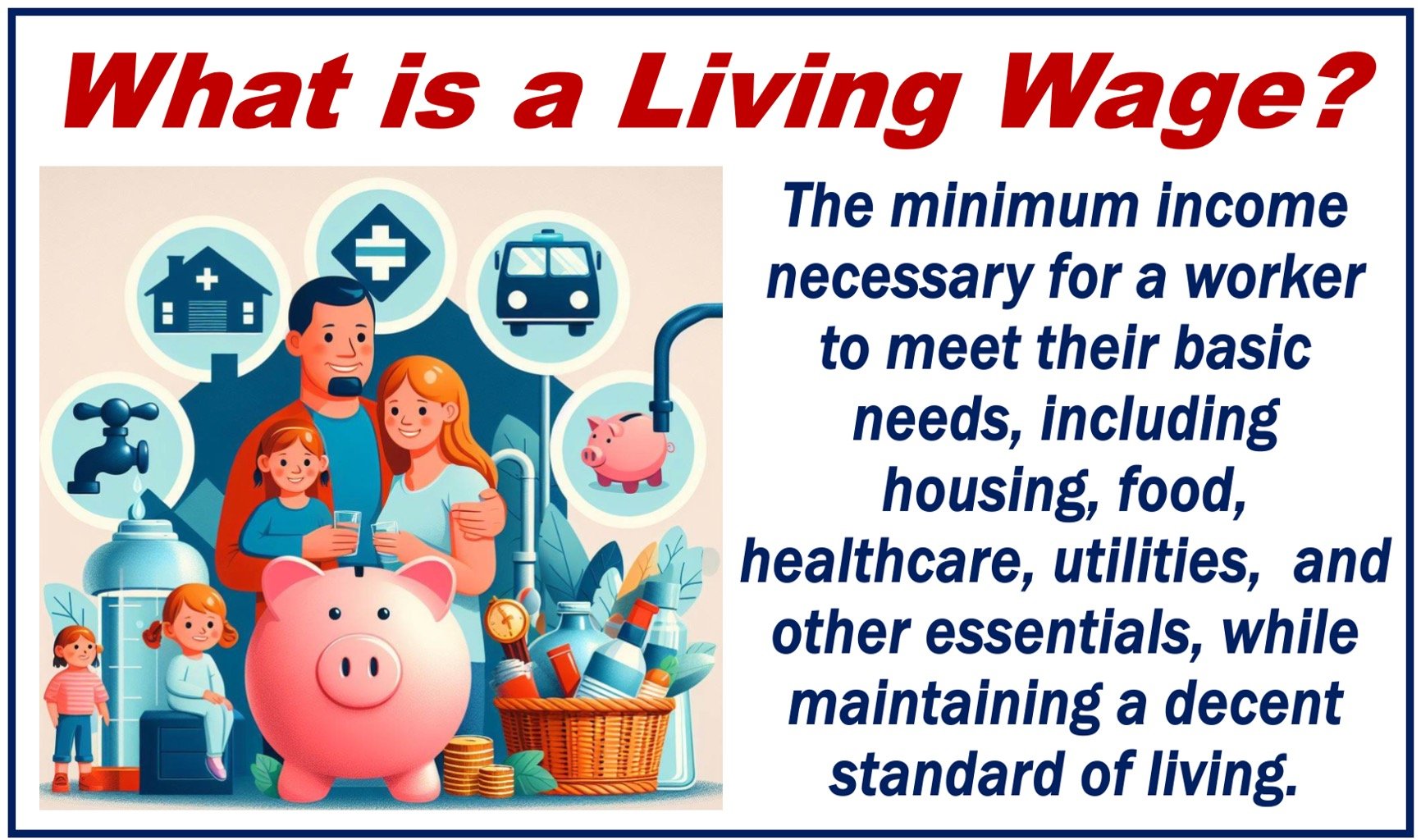A Living Wage is the minimum amount of income we need to meet our basic needs, that is, for housing, clothing, health, transport, utilities, hygiene, education, and unexpected events. With that wage, we should be able to afford a decent standard of living for ourselves and our families.
It is the minimum amount of income people need to experience economic security, which is the feeling of stability and safety when it comes to our finances, and knowing we can pay for essentials.
It is not the same as the minimum wage, which is the lowest amount an employer can legally pay their workers. A living wage aims higher.
The Global Living Wage Coalition has the following definition of the term:
“The remuneration received for a standard workweek by a worker in a particular place sufficient to afford a decent standard of living for the worker and her or his family.”
“Elements of a decent standard of living include food, water, housing, education, health care, transportation, clothing, and other essential needs including provision for unexpected events.”
The concept of a living wage has been around for thousands of years. Ancient Greek thinkers like Aristotle (384-322 BC) and Plato (428-348 BC approx.) discussed the concept of a wage that enables a good life, where basic needs are met.
Why Does it Matter?
When a country’s minimum wage is not enough to cover a worker’s fundamental needs, a living wage becomes essential.
People who work full-time shouldn’t struggle to put food on the table, pay for safe housing, or access basic healthcare.
A living wage aims to make sure that a worker’s income allows them to live with dignity.

How is a Living Wage Calculated?
Unlike a minimum wage, which the government of a country calculates, a living wage is not one single number. It depends on several factors:
-
Where you live
The cost of living varies drastically. Renting or buying somewhere to live, for example, is typically much more expensive in a large city than in a small town.
-
Family Size
There’s a difference between supporting yourself and supporting a whole family.
-
Essential Needs
This includes basics (essentials) like food, housing, clothing, healthcare, transportation, utilities, education, childcare, personal savings, and a little extra for unexpected expenses.
-
Local taxes
Local income tax and national insurance contribution levels can greatly affect a worker’s disposable income.
-
Healthcare
Healthcare costs vary by country; some offer it free of charge while others do not. These expenses, along with employer-provided health insurance contributions, are important considerations when calculating a living wage.
-
Education costs
For families with children, the cost of school supplies, fees, and potentially college savings could be considered. As with healthcare, free education is not widely available in every country.
Organizations that advocate for living wages research these factors thoroughly to come up with region-specific hourly wage recommendations.
The Debate
Most of us agree that workers deserve a living wage. However, there are disagreements on how to achieve it:
-
Businesses
Some people argue that increased wages could force businesses to raise prices, lay off workers, or even shut down.
-
Government Policies
Others believe that it is the government’s responsibility to either raise minimum wages or provide support for workers who cannot meet basic needs.
-
The Subsidy Concern
However, some economists worry that providing this support could inadvertently reward companies that pay less than a living wage, as the government essentially subsidizes their labor costs. Government assistance programs might remove the pressure on businesses to pay a living wage if they know the government will fill the gap for workers, they wonder.
The Benefits of a Living Wage
Here are some potential benefits to the idea of a living wage:
-
Reduced Poverty
When people earn enough to live on, fewer families slip into poverty.
-
Stronger Communities
Workers with a stable income can contribute more to their local economies.
-
Personal Health
Stress from financial burdens takes a toll on physical and mental health.
-
Public Health
The likelihood of public health scares, such as epidemics, decreases when everyone has access to proper healthcare.
-
Worker Morale
We are more likely to be loyal to our employers and work more productively if we receive a living wage.
-
Economic Growth
If workers have more money to spend, demand for goods and services will rise, which will help boost the economy.
-
Reduced Inequality
The income gap, the difference between high-income earners and low-income earners, will be smaller.
-
Lower Government Spending
If the living wage becomes a country’s minimum wage, the government will spend less on assistance programs.
-
Sustainable Business Practices
Businesses that pay a living wage will be viewed more favorably, which can lead to sustainable long-term growth. In today’s society, companies that treat their employees fairly have a better brand image.
Final thoughts
The idea of ensuring that hard work translates into a decent life for individuals and families is a popular one, resonating with most of us.
However, the specific discussion about a living wage is complex. There are many factors to consider, and there isn’t always a consensus on how much importance to place on each one.
